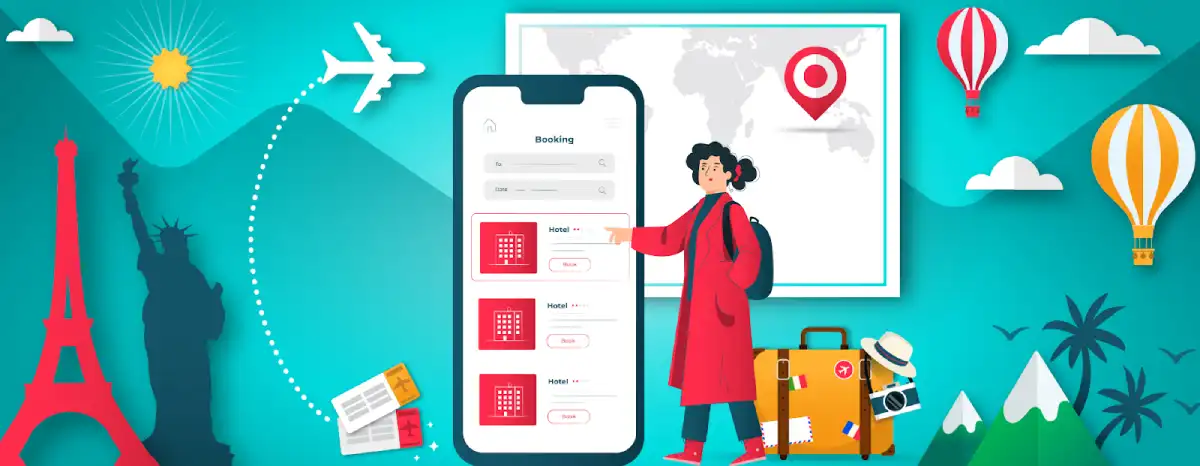
In today’s fast-paced world, where wanderlust is soaring, travel apps have become indispensable tools for modern adventurers. These handy applications have revolutionized the way we plan, book, and navigate our journeys.
In this article, we’ll dive deep into the thriving travel app industry, unraveling its demand, benefits, and the essential features required for successful travel app development.
So buckle up as we embark on this exhilarating expedition, to find a way to the best travel app development solutions!
The Demand and Benefits of Travel Apps
With the surge in smartphone accessibility and the growing reliance on digital platforms, travel apps have experienced an unprecedented surge in demand. Here are some compelling reasons why travelers have warmly embraced these apps:
1. Seamlessness in Planning: Travel apps provide a one-stop hub for destination research, price comparisons, and itinerary creation. From flight and hotel bookings to uncovering local attractions and dining options, these apps simplify the entire planning process.
2. Real-Time Updates: Stay in the loop with live updates on flight schedules, gate changes, and delays. Travel apps keep you well-informed about any modifications or disruptions, ensuring a smoother journey.
3. Personalized Recommendations: Tailored suggestions based on individual preferences and interests enrich the travel experience. These apps employ algorithms to recommend attractions, activities, and dining spots that align with users’ tastes, making every trip a unique adventure.
4. Effortless Navigation: Bid farewell to the days of grappling with maps and guidebooks. Travel apps provide interactive maps, GPS tracking, and navigation features, ensuring travelers never lose their way.
Benefits of Travel Apps for Businesses
Travel apps not only cater to the needs of individual travelers but also offer significant advantages to businesses operating in the travel industry. Let’s explore how these apps benefit businesses:
1. Amplified Customer Engagement: Travel apps foster direct communication between businesses and customers. Companies can send personalized offers, promotions, and notifications, keeping travelers engaged and encouraging repeat bookings.
2. Streamlined Operations: Through travel apps, businesses can streamline their operations by automating various processes such as bookings, payments, and customer support. This not only increases efficiency but also reduces human errors.
3. Data-driven Insights: Travel apps collect valuable user data, enabling businesses to gain insights into customer preferences, behavior patterns, and market trends. This data can be leveraged to refine marketing strategies and improve services.
Types of Travel Apps
The travel app industry offers a diverse range of applications, catering to different aspects of the travel experience. Here are some popular types of travel apps:
1. Booking Apps: These apps focus on flight and hotel reservations, allowing users to compare prices, browse reviews, and conveniently make bookings.
2. Itinerary Apps: Perfect for organizing trips, itinerary apps help users create day-to-day plans, set reminders, and manage reservations all in one place.
3. Navigation Apps: Designed to assist travelers in unfamiliar territories, navigation apps provide maps, GPS tracking, and turn-by-turn directions to ensure a seamless journey.
4. Local Guide Apps: These apps act as virtual tour guides, offering information on local attractions, dining options, events, and insider tips.
Main Features of a Travel App
Successful travel app development requires meticulous planning and execution. Here are some essential features and steps to consider:
1. User Registration: Allow users to create accounts, enabling personalized experiences and access to saved preferences.
2. Search and Filters: Implement robust search functionality with filters for destinations, flights, hotels, and activities to help users find their ideal options.
3. Booking Integration: Integrate APIs of popular booking platforms to enable seamless flight, hotel, and car rental bookings within the app.
4. Push Notifications: Keep users informed about booking confirmations, updates, discounts, and personalized recommendations through push notifications.
Travel App Development Steps and Tech Stack
1. Idea and Conceptualization: Define the purpose, target audience, and unique selling points of your travel app. Conduct market research to identify user needs and preferences.
2. Wireframing and Design: Create wireframes and design mockups to visualize the app’s structure and user interface. Ensure a user-friendly and visually appealing design.
3. Development: Select a suitable tech stack, including programming languages (e.g., Swift for iOS or Java for Android), frameworks, and libraries. Follow an Agile development approach for efficient and iterative progress.
4. Testing and Quality Assurance: Conduct comprehensive testing to identify and rectify any bugs, glitches, or usability issues. Ensure a seamless user experience across different devices and platforms.
Monetization Strategies
Finally, let’s explore how to monetize your travel app and transform it into a profitable venture:
1. In-App Purchases: Offer users the option to unlock premium features or exclusive content within the app through in-app purchases. This could include access to advanced trip planning tools, additional destination guides, or special discounts on travel-related services. By providing added value to users willing to pay, you can generate revenue while enhancing the overall user experience.
2. Subscriptions: Introduce subscription models that provide users with ongoing benefits and premium features. This can include access to personalized travel recommendations, exclusive deals and discounts, priority customer support, or ad-free browsing. Offering different subscription tiers, such as monthly or annual plans, allows users to choose the option that best suits their needs and budget while ensuring a steady revenue stream for your app.
3. Advertising: Implement targeted advertising within your travel app to generate revenue. Collaborate with relevant travel brands, airlines, hotels, or local businesses to display ads tailored to users’ interests and preferences. Consider utilizing native ads that seamlessly blend with the app’s design and content, ensuring a non-intrusive user experience. Additionally, you can explore partnerships with ad networks to maximize ad revenue potential.
4. Sponsored Content: Forge partnerships with travel brands or influencers to feature sponsored content within your app. This can include travel guides, destination highlights, or curated itineraries that promote specific products, services, or experiences. By leveraging the influence and credibility of trusted partners, you can monetize your app while providing valuable and engaging content to users.
5. Affiliate Marketing: Implement affiliate marketing strategies by partnering with travel agencies, airlines, hotel booking platforms, or car rental companies. Through affiliate programs, you can earn a commission for each successful booking or referral made through your app. Integrate affiliate links or promotional codes within the app and track conversions to ensure accurate commission payouts.
6. White Labeling: Explore the possibility of white labeling your travel app for other businesses in the travel industry. By offering customized versions of your app with their branding and features, you can generate revenue through licensing or travel app development fees. This strategy allows other businesses to leverage the benefits of a travel app without investing in the travel app development from scratch.
7. Data Monetization: As your travel app accumulates user data and insights, you can explore opportunities to monetize this valuable resource. By anonymizing and aggregating user data, you can sell anonymized datasets to travel industry stakeholders, such as tourism boards, market research firms, or hospitality providers. Ensure compliance with data privacy regulations and prioritize user consent and data protection.
When implementing monetization strategies, it is crucial to strike a balance between revenue generation and maintaining a positive user experience. Always prioritize the value you provide to your users and ensure that any monetization methods align with their needs and expectations.
Conclusion
The travel app industry has witnessed exponential growth, fueled by the increasing demand for convenient and personalized travel experiences.
From seamless planning and real-time updates to personalized recommendations and easy navigation, travel apps have become essential for modern adventurers. Businesses can leverage these apps to enhance customer engagement, streamline operations, and gain valuable insights.
By understanding the travel app development process and incorporating essential features, entrepreneurs can successfully tap into this booming industry and monetize their travel apps.
So, get ready for the digital adventure and embark on the exciting journey of travel app development today!
Remember, the world is your oyster, and with a travel app in your pocket, the possibilities are limitless. Bon voyage!






